New season has menu of mouthwatering morning cuisine, Li Yingxue reports.
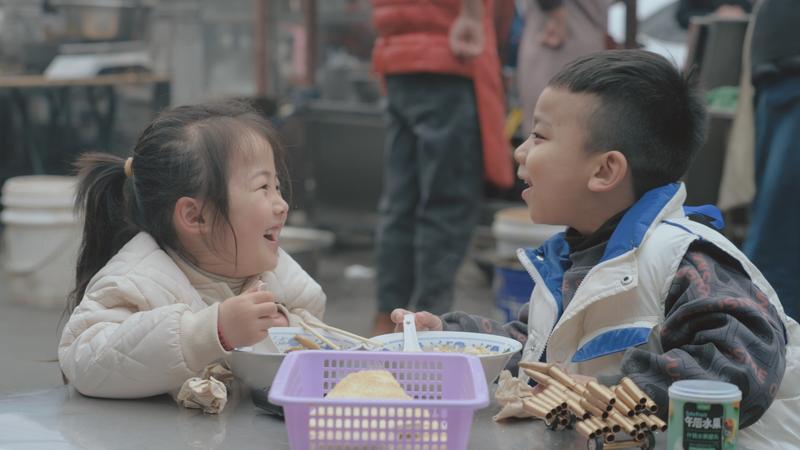 Children enjoy their breakfast at a store. (PHOTO PROVIDED TO CHINA DAILY)
Children enjoy their breakfast at a store. (PHOTO PROVIDED TO CHINA DAILY)
This is mouthwatering viewing. From four-ingredient soup in Henan province's Kaifeng and sweet and soft glutinous rice from Yunnan province's Xishuangbanna to the crispy, but not greasy, hamburgers in Shaanxi province's Xi'an, delicacies from across China whet the appetite of those sitting at home.
The food, apart from being spectacular, all have one thing in common — they are breakfast dishes, and have to be enjoyed early in the morning, before they are sold out.
The fourth season of Breakfast in China, a documentary series, which premiered on Nov 7 online via video platform Tencent Video, and on Southeast Satellite TV and Fujian Straits Satellite TV.
From the diners who concentrate on their food to the store owners who work hard from dawn to dusk, as well as the ups and downs of everyday life, all the elements mesh together for a tantalizing experience.
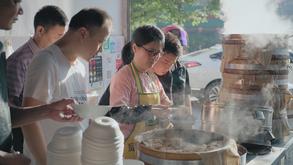 People wait for the breakfast to be dished up in the documentary Breakfast in China. (PHOTO PROVIDED TO CHINA DAILY)
People wait for the breakfast to be dished up in the documentary Breakfast in China. (PHOTO PROVIDED TO CHINA DAILY)
With over half of the episodes already released, the new season has gained a score of 8.9 out of 10 on popular review site Douban and many have marked all the stores featured in the show for visiting in the future. This mirrors the reaction to previous seasons.
Wang Shengzhi, general director of the show, originally planned to shoot 100 episodes for the Breakfast in China series and has achieved that goal in 2020, after three seasons. At that time, he felt the topic had been exhausted.
However, this year, Wang rediscovered his passion for recording normal people's lives and restarted the series.
During the past two years, while making other documentaries that record the stories of musicians, writers and chefs, he still had an eye on the local breakfast stores in whichever city he happened to be working in.
Wang says he felt like he was "walking on eggshells", as he didn't know whether the fans still liked his storytelling or not, even though the previous three seasons recorded an average score of 8.5 out of 10 on Douban.
"This season is still about the seemingly unsung folk foods and the lives of ordinary people," Wang says.
"This season has no major changes, the same as the food from the breakfast stores," Wang says. "If someone left their hometown as a teenager and returned at middle age, they would expect the food at the breakfast store to still taste the same as before."
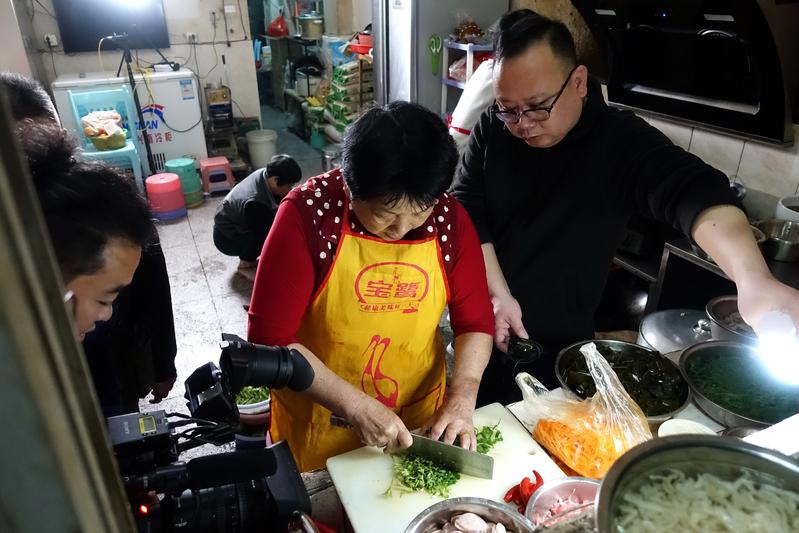 Wang Shengzhi (right), director of the show, shoots the new season at a breakfast store. (PHOTO PROVIDED TO CHINA DAILY)
Wang Shengzhi (right), director of the show, shoots the new season at a breakfast store. (PHOTO PROVIDED TO CHINA DAILY)
However, when planning for the new season, Wang thought about how to apply a different perspective from the previous seasons. "We try not to only focus on the warmth in each family, but to present a bigger society through our narration," he says.
The reviews confirm Wang's efforts were successful, and many viewers claim to have been overcome with emotion.
"I was touched by one review that said the show is presenting struggle and tenderness in a poetic way," Wang says.
Wang has particular requirements for selecting each breakfast store. It has to be a regular spot for neighbors nearby and it's usually a family business that has been run by two generations.
"I often pick a store that only focuses on one dish. If a family makes a dish for two generations, it is undoubtedly good food," he says.
In the first three seasons, the store owners were mostly born in the 1960s and '70s. The new season sees some born in the '80s.
Wang could tell the younger restaurateurs have more hobbies and are less burdened than the older generation, "but they all work so hard".
 Chinese hamburger from Shaanxi province's Xi'an. (PHOTO PROVIDED TO CHINA DAILY)
Chinese hamburger from Shaanxi province's Xi'an. (PHOTO PROVIDED TO CHINA DAILY)
In one episode, Wang records the story of a young couple running a sheep intestine soup store in Cangzhou, Hebei province, and the wife is weeks away from giving birth.
She comes to the store every day with her husband, even though her feet are swollen. Crammed in the small store, they don't complain or grumble, yet they joke with each other every day.
"I guess there is a romantic reason, perhaps the wife wants the unborn baby to hear the father's voice as much as possible and get a feel for their store," Wang says.
Wang wants to show the lives of restaurateurs, the delicious food, regional customs and even a philosophy in life, all in a seven-minute episode.
"We don't want the food and the story of the restaurateurs to be separated, as both elements are complementary to each other," Wang says, adding that each episode goes through up to five round of editing and, sometimes, the crew has to do reshoots.
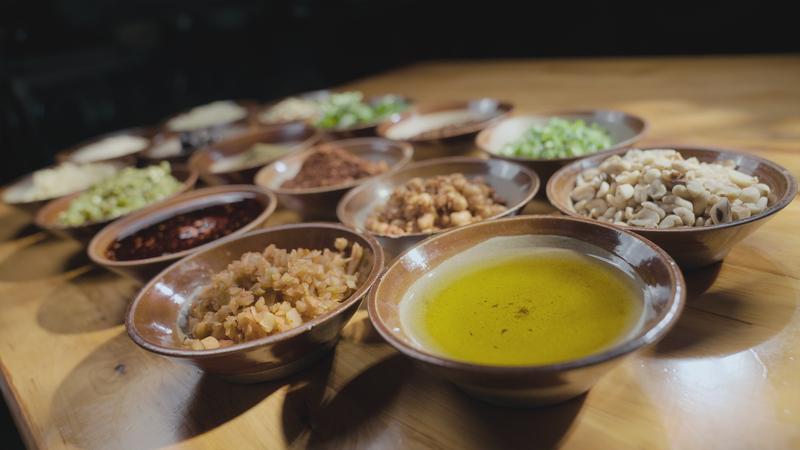 Various side dishes of beancurd rice from Peiling district in Chongqin. (PHOTO PROVIDED TO CHINA DAILY)
Various side dishes of beancurd rice from Peiling district in Chongqin. (PHOTO PROVIDED TO CHINA DAILY)
The small breakfast store and the intensive tempo of serving breakfast also bring challenges for the crew, as they have to shoot in real time while trying not to interrupt the service.
"The young directors are about the same age as the owners' children, so they have a natural connection," he says.
Wang thinks the show can increase the audience's love for life as they see the bustle in different regions and people enjoying the delicious food.
"They are not others, they are us, and once you watch their stories, you can absorb their courage," he says.
Zhu Lexian, producer of the show, themed "Morning, World" for the fourth season, says that the documentary series is an insight into the changing of the times and resonates with the current mood.
"Wang and his crew can showcase the characteristics of local people through local food," he says. "They have this sensibility to notice the changing times and present some meaning to life."
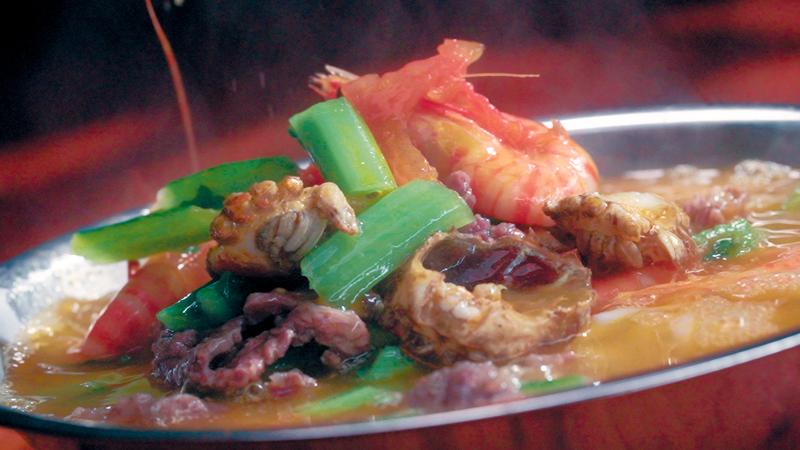 Noodles with seafood from Beihai, Guangxi Zhuang autonomous region. (PHOTO PROVIDED TO CHINA DAILY)
Noodles with seafood from Beihai, Guangxi Zhuang autonomous region. (PHOTO PROVIDED TO CHINA DAILY)
Compared with lunch and dinner, Zhu believes that breakfast has a stronger place in society, and that the memory of breakfast is always linked to hometown and a familiar neighborhood.
"The breakfast store owners are also the chefs and servers at the restaurant. Compared with the excellent cooking skills of the chefs at other types of restaurant, their hard work in the early morning is one key element of their delicious food," Zhu says.
In the selection of the places, Zhu adds, he hopes that big cities and small towns can both be included. "The important thing is to be able to present the most characteristic local breakfast."
He often checks the danmu, or live comments, for the show online, and he notices that one major element in the comments is regional pride, while another is the recommendation of their own hometown favorites. A common question among them is: "Why don't the crew come to my hometown to shoot?"
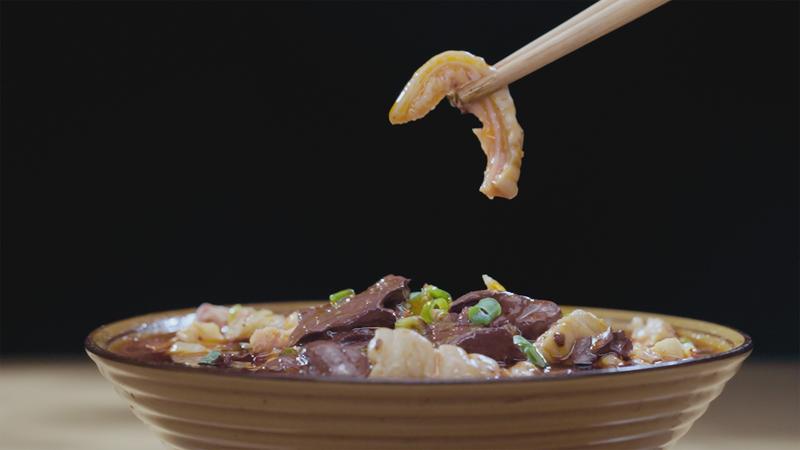 Pork intestine and blood from Sichuan province's Dayi county. (PHOTO PROVIDED TO CHINA DAILY)
Pork intestine and blood from Sichuan province's Dayi county. (PHOTO PROVIDED TO CHINA DAILY)
Audience recommendation is one major way for the crew to find new breakfast restaurants. During preparation for the season, the crew listed out all the restaurants the audience recommended and conducted research on each of them.
The directors may have their limits and food preference, so the viewers' opinions are quite important to the crew, according to Zhu.
As more food-themed documentaries are being produced, Zhu thinks viewers expect something new; something they've never heard of.
Besides Breakfast in China, he is also planning new food documentaries.
"Chinese food is rich and varied, and what's more diverse and abundant is the Chinese culture and history behind it, which is what we want to expand upon in our shows," he says.
Contact the writer at liyingxue@chinadaily.com.cn


